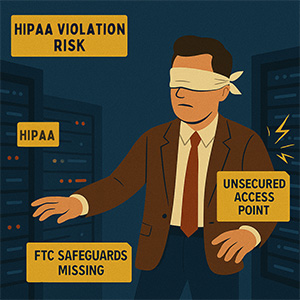
Many small business owners operate under the misconception that regulatory compliance is only for large corporations. In 2025, that mindset is a costly mistake. With increased enforcement of data protection and privacy laws, compliance blind spots are putting small businesses directly in the crosshairs.
Ignoring compliance doesn’t just result in a slap on the wrist—it can cost you thousands, damage your reputation, and even shut your doors for good.
Why Compliance Matters More Than Ever
Regulatory agencies like the Department of Health and Human Services (HHS), the Payment Card Industry Security Standards Council (PCI SSC), and the Federal Trade Commission (FTC) have all ramped up enforcement. Whether you store customer data, process credit cards, or collect sensitive information, your business is expected to comply—and fast.
Ready to take a proactive approach to compliance? Book a FREE discovery call and let us help you get ahead of the risks.
Key Regulations Affecting Small Businesses
HIPAA: Health Care Data Security
If you handle any kind of protected health information (PHI), HIPAA compliance is mandatory. Recent updates require:
-
Mandatory encryption for all electronic PHI
-
Routine risk assessments
-
Employee data privacy training
-
Documented incident response procedures
In 2024, one small health clinic was fined $1.5 million for skipping these steps. Don’t make the same mistake.
PCI DSS: Secure Payment Processing
If you process credit card payments, you must follow PCI DSS rules. These include:
-
Proper encryption of payment data
-
Secure storage policies
-
Regular testing and monitoring
-
Access controls for cardholder information
Fines for PCI DSS noncompliance can range from $5,000 to $100,000 per month. Want to stay compliant and secure? Explore our Network Security services for expert help.
FTC Safeguards Rule: Financial Info Protection
This regulation applies to any business collecting consumer financial data, including accounting firms and tax preparers. Requirements include:
-
A written information security plan
-
Appointment of a qualified individual to oversee security
-
Risk assessments and regular updates
-
Mandatory multifactor authentication (MFA)
Violating the FTC Safeguards Rule can result in steep fines: up to $100,000 per incident for your business and $10,000 for individuals involved.
Real-World Consequences
Take the case of a small medical practice hit by ransomware due to outdated security. The result? A $250,000 fine, a massive PR fallout, and a loss of patient trust. The business never recovered. That’s the danger of ignoring a compliance blind spot.
Don’t wait for a breach to discover what your IT provider should have already fixed. Sign up for our Cybersecurity Tip of the Week to stay ahead of the most common threats.
How To Eliminate Compliance Blind Spots
-
Conduct Risk Assessments – Regularly audit your system for vulnerabilities
-
Strengthen Security Protocols – Encrypt data, implement MFA, and set access controls
-
Train Your Staff – Make sure every employee understands compliance rules
-
Have a Response Plan – Be ready to act quickly if a breach happens
-
Partner with Experts – A reliable IT team can help you stay compliant and ahead of changing regulations
Get Compliant Before It Costs You
Regulatory compliance is not optional—it’s a core part of protecting your business. If you’re not 100% sure where your vulnerabilities are, now is the time to act.
Schedule a FREE Network Security Assessment to find out if your business has compliance blind spots—and how to fix them before it’s too late.



